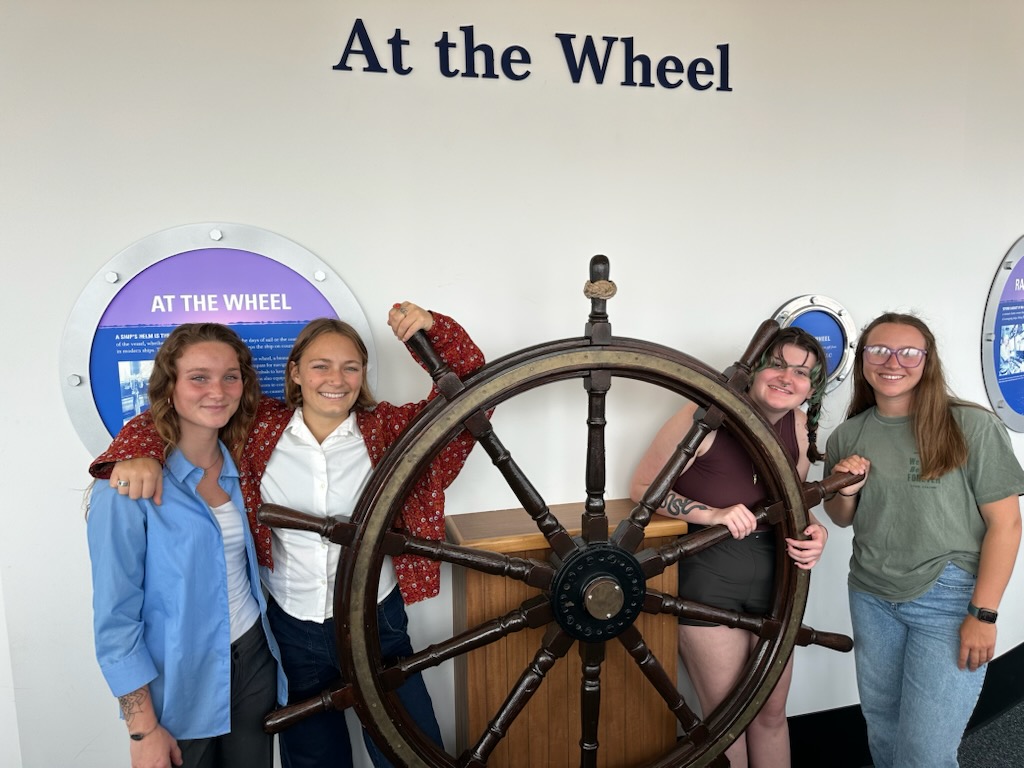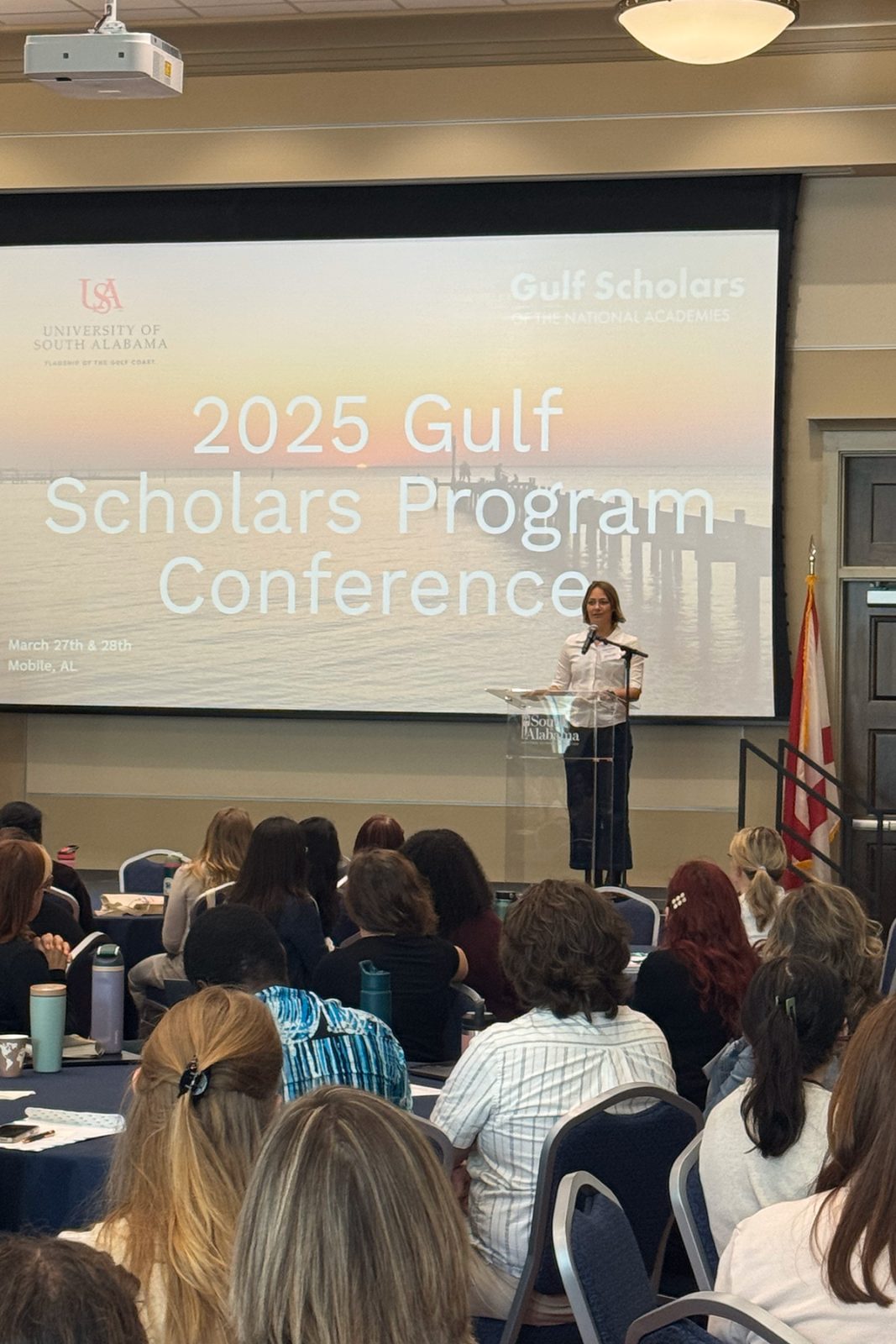
Left to right: Maddy Vashaw ’25, Hazel Schaub ’27, Dai Goebel ’26 and Olivia Stortz ’25 joined four faculty members to represent Eckerd College at the conference in March. Photos courtesy of Amanda Hagood
For the past three years, Eckerd College faculty have attended the annual Gulf Scholars Conference for the purpose of sharing ideas, learning, and building the Gulf Scholars community. The conference includes presentations and discussions from representatives of 24 colleges and universities in the Gulf region.
The topics are wide ranging—including career development, the future of the region, and Gulf-related classes and curriculum.
But for Eckerd, this year was different. This time, the Eckerd cohort included four students along with four faculty members. Held March 27–28 at the University of South Alabama in Mobile, the conference included Eckerd senior Olivia Stortz, who presented her research on mangroves in Tampa Bay, and sophomore Hazel Schaub, who was one of four students invited to offer closing remarks.
“This was definitely a milestone for us demonstrating the program’s growth,” says Amanda Hagood, Ph.D., animal studies instructor and co-director of the Eckerd College Gulf Scholars Program. “And it was a great opportunity for our students to connect with students from all the other schools and learn what other Gulf Scholars are interested in.”
The Eckerd Gulf Scholars Program is supported by a grant from the National Academies of Science, Engineering and Medicine. It provides financial, academic and research-based resources. It also connects the College to the 23 sister Gulf Scholars institutions in the region. Aided by a $3,000 stipend, each Eckerd Gulf Scholar takes intensive courses in the spring and fall semesters and then wraps up their program with a Reflective Service Learning course in Winter Term—a three-week, one-class term in January.
Since 2021, Olivia, a senior marine science student from Schuylerville, New York, has been studying mangrove vegetation and soil data from the marshes and mangrove forests in the Cockroach Bay section of Tampa Bay. “Mangroves are extremely important for storm-surge control because they act as a natural seawall,” she says of her presentation to about 200 people. “They slow down waves coming onto land before they start impacting the uplands. But a lot of mangroves have been disturbed in some way by human action. Living shorelines are a step in the right direction, but it will still take years to try to mitigate what we damaged.
“I thought it went really well,” she adds. “I was in the first cohort of the Eckerd Gulf Explorers program in 2023, and it was very reassuring to see so many other people from the Gulf region.”
Marine geology student Hazel grew up in Spokane, Washington. “I came to the conference pretty open-minded,” she says. “I came as a Gulf Scholar Student Fellow, and I wanted to learn what people were doing at other schools. I was really inspired by the conversations we were having … about our hopes and fears and policy issues and expressing excitement and hope for reform.
“And I was struck by the unique position Eckerd is in right now. We have a powerful opportunity to become a resilient community. Everyone at Eckerd knows the implications of our changing climate. And it was important to tell other schools that we were really affected by [Hurricanes] Helene and Milton, and that it was not good.
“Eckerd just raises cool people,” she says. “And to be at the conference with my peers and representing Eckerd … I told my Gulf Scholar classmates who didn’t go that they have to come next year. It’s really inspiring. We can make change.”
In addition to Hagood, Eckerd faculty who attended the conference included Amanda Hoffman-Hall, Ph.D., assistant professor of environmental studies and faculty lead for the Winter Term Gulf Impact course; Kathleen Robinson, Ph.D., assistant dean of faculty; and Anna Guengerich, Ph.D., assistant professor of anthropology and member of the faculty advisory board for Gulf Scholars. The group also included Megan Hoffman, fine arts instructor at Clearwater High School.
Along with Hazel and Olivia, the other Eckerd students attending the conference were Gulf Scholars Dai Goebel, a junior environmental studies and animal studies student from Fargo, North Dakota, and Maddy Vashaw, a senior marine science and economics student from Pulaski, New York.
“It’s really important for us to be able to come together,” Hagood adds, “and it reminds us of the many challenges the region faces. To be able to speak to those challenges, such as spending cuts that endanger our ability to carry on.
“But it’s also really heartening to see a large room filled with people who want to make the Gulf region more sustainable. It’s great to know the work is still getting done.”













